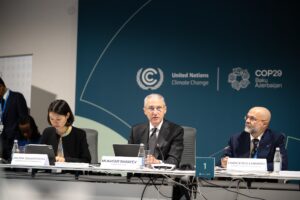Physical Address
23,24,25 & 26, 2nd Floor, Software Technology Park India, Opp: Garware Stadium,MIDC, Chikalthana, Aurangabad, Maharashtra – 431001 India
Physical Address
23,24,25 & 26, 2nd Floor, Software Technology Park India, Opp: Garware Stadium,MIDC, Chikalthana, Aurangabad, Maharashtra – 431001 India

Developed nations are facing criticism over their approach to climate finance, despite claims earlier this year that they had surpassed the long-elusive $100 billion annual target by mobilizing $115.9 billion in 2022. Experts argue that the majority of this funding, primarily in the form of loans, places undue financial pressure on developing countries, raising concerns about the effectiveness and fairness of current strategies.
Climate Finance: A Milestone or Misstep?
The “Climate Finance Provided and Mobilised by Developed Countries in 2013-2022” report reveals that 69% of the public climate finance provided in 2022 was in the form of loans, totaling $63.6 billion. Grants accounted for just 28%, or $25.6 billion, with the remainder coming from other instruments such as equity.
Developed countries have hailed the 2022 figures as a success, arguing that they demonstrate progress in addressing climate challenges faced by vulnerable nations. However, critics contend that the heavy reliance on loans undermines the effectiveness of climate finance. “Loans are not aid; they are liabilities,” said one expert. “For developing countries already grappling with debt crises, this approach exacerbates their financial vulnerabilities rather than alleviating them.”
Why were there sparks over contested calculations?
The announcement of having mobilized $115.9 billion has also sparked a broader debate over how climate finance is measured. Many experts argue that the figure is inflated, with private sector contributions and leveraged investments often double-counted. Furthermore, the opaque nature of reporting has drawn criticism, with calls for a more transparent and standardized framework for assessing climate finance.
“The $100 billion target was always a political compromise, but even that modest goal is being met in ways that do not genuinely support the most vulnerable,” said a representative from a leading climate advocacy organization.
Developing countries have long advocated for an increased share of grants rather than loans in climate finance. Grants provide much-needed resources for adaptation and mitigation efforts without adding to the fiscal burden. Yet, developed countries have largely maintained their preference for loans, citing fiscal constraints and the need to leverage private sector contributions.
In this context, innovative proposals, such as French President Emmanuel Macron’s suggestion of a global stock-market trade levy, are gaining attention. Macron’s 0.1% levy could create a predictable and equitable source of funding to meet the $1.3 trillion annual climate finance goal envisioned under the Paris Agreement. However, the proposal has yet to gain traction among developed nations, many of which remain divided over how to shoulder the financial responsibility for global climate action.
Trust in the Balance
The persistent reliance on loans and contested claims of meeting finance goals have strained trust between developed and developing nations. As negotiations intensify ahead of the COP29 summit, the onus is on developed countries to rebuild confidence by committing to fairer, more transparent, and genuinely supportive climate finance mechanisms.
“For climate finance to be meaningful, it must empower developing nations without drowning them in debt. Grants, equity, and innovative mechanisms should be prioritized over loans,” said a senior negotiator from a Pacific island nation.
The road to equitable climate finance remains fraught, with developed countries under growing pressure to demonstrate leadership in addressing the global climate crisis. Whether they rise to the challenge could define the trajectory of international climate action in the critical years ahead.
References:
Banner Image: Photo by COP29 at Azerbaijan on X https://x.com/COP29_AZ/status/1858413315711475754/photo/1